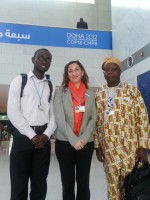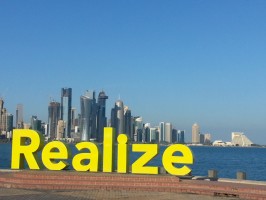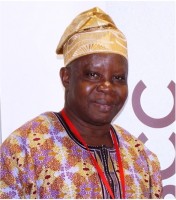

Professor Babatunde Ajayi (School of Agriculture and Agricultural Technology, Nigeria)) and Mr. Isaiah Owolabi (Project HACEY, Nigeria), York University accredited delegates to COP 18 of UNFCCC can be seen, at left, with Philosophy Department professor, Idil Boran, along with other pictures of Doha and the convention centre.

Here is Professor Ajayi’s biography – WELCOME to the York University Delegation during COP 18!
- See more at: http://www.irisyorku.ca/category/blog/director-blog/#sthash.gxRVI9Pj.dpufNigeria), York University accredited delegates to COP 18 of UNFCCC can be seen, at left, with Philosophy Department professor, Idil Boran, along with other pictures of Doha and the convention centre.
ABOUT PROF. BABATUNDE AJAYI - profile kindly supplied by Project HACEY
 "His area of research is the production of Bio-composites materials from wood and agricultural wastes. Currently, he is working on the production of plastic bonded composites using virgin plastic (HPDE), recycled plastic (LPDE), and used car battery case as binders. He is also investigating the suitability of agricultural wastes for the manufacture of cement bonded composites as affordable products for core low cost housing for low income earners. Professor Babatnde Ajayi was born on 25th August, 1955 in Ijan Ekiti, Nigeria. He obtained his Diploma in Forestry at the school of Forestry Ibadan, PGD in Timber and Material Technology at High- Wycombe, UK in 1986, MSc in Forest Industries Technology at Bangor, UK in 1990 and a PhD in Wood Science and Bio-Composites Technology from the Federal University of Technology, Akure in 2000. He assumed the status of a Professor in 2010 and he is currently the Head of Department of Forestry and Wood Technology, Federal University of Technology, Akure, Nigeria. He has published more than 50 papers in reputable local and international journals and presented papers at 33 conferences and professional meetings.
"His area of research is the production of Bio-composites materials from wood and agricultural wastes. Currently, he is working on the production of plastic bonded composites using virgin plastic (HPDE), recycled plastic (LPDE), and used car battery case as binders. He is also investigating the suitability of agricultural wastes for the manufacture of cement bonded composites as affordable products for core low cost housing for low income earners. Professor Babatnde Ajayi was born on 25th August, 1955 in Ijan Ekiti, Nigeria. He obtained his Diploma in Forestry at the school of Forestry Ibadan, PGD in Timber and Material Technology at High- Wycombe, UK in 1986, MSc in Forest Industries Technology at Bangor, UK in 1990 and a PhD in Wood Science and Bio-Composites Technology from the Federal University of Technology, Akure in 2000. He assumed the status of a Professor in 2010 and he is currently the Head of Department of Forestry and Wood Technology, Federal University of Technology, Akure, Nigeria. He has published more than 50 papers in reputable local and international journals and presented papers at 33 conferences and professional meetings.
In 2011, he received a Merit Award for Local Raw Materials Content, Research and Development from the Raw Materials Research and Development Council of Nigeria at TECHNO-EXPO 2011 (A Technology and Innovative Fair) in Abuja, Nigeria. He also exhibited his work at the United Nations Geneva- 2010 Exhibitions of Innovative Wood Products and for the 2011 International Year of the Forest.
He is a member of many professional bodies including the Institute of Wood Science, U.K., Commonwealth Forestry Association, U.K., Forest Products Society, U.S.A., Forestry Association of Nigeria, Nigerian Society for Environmental Management, Forest and Forest Products Society, Nigeria, International Union of Forestry Research Organization, International Inorganic Bonded Composites, USA and Society of Wood Science and Technology."
About SAAT - from the website.
Over the past years, the School of Agriculture and Agricultural Technology (SAAT), like every other school or faculty in Nigerian Universities, focused essentially on teaching and research (basic and applied). It determined its teaching and research agenda within the framework provided by the National Universities Commission, the main regulatory body, and the perceived needs of the society. The scope of this teaching and research agenda has been severally limited by the relatively dwindling government funding for the universities. This has led to most teaching and research facilities (laboratories, lecture rooms, libraries, office accommodation, communication and information equipment. etc) becoming obsolete, and inadequate to satisfy the aspiration of the school to meet the challenges of teaching and research in Nigerian Agriculture in the 21st century. In order to be at the cutting edge of agriculture and agricultural technology and impact positively and significantly on Nigeria’s rural, agricultural and agro-industrial landscape, the school has accepted a paradigm shift towards “the town and gown”. In this new paradigm, SAAT will not only teach and research, but will also render services that can transform the Nigerian socioeconomic and technological landscape. The services will be rendered to its stakeholders within the university and in larger Nigerian society.
The implication of the new paradigm is that SAAT’s work programme agenda will be needs driven Teaching and research will become more tailored to needs of the society than were previously case while SAAT will devote a substantial proportion of its resources and expertise to rendering services to its stakeholders within the larger Nigerian society. A further implication of the new paradigm is that the school will be more involved in the activities of the larger Nigeria society, by rendering services and soliciting for support in terms of collaboration, patronage, grants and endowment.
Akure is NE of Lagos, about a third of the way to Abuja."


